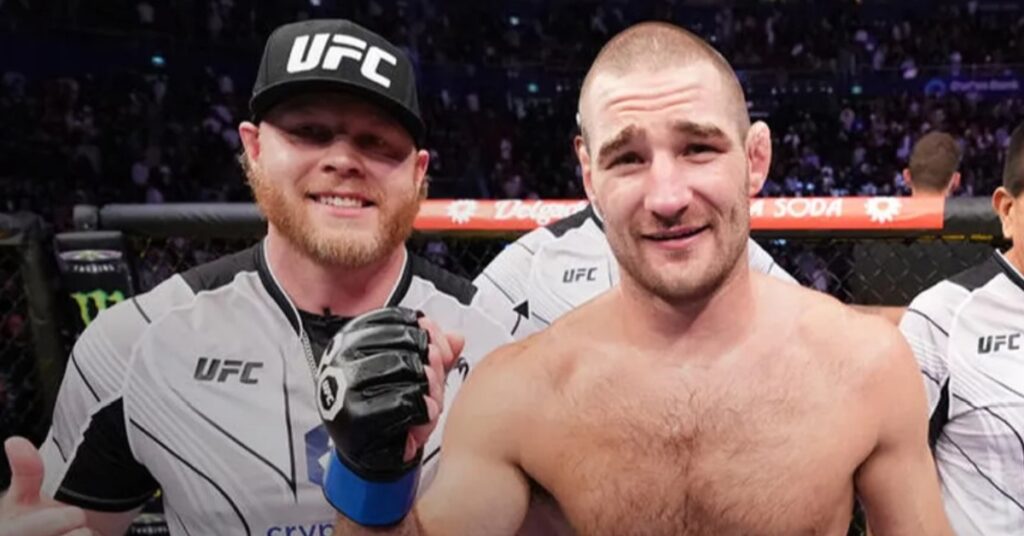The BANG Effect: A Statistical Look at 2013′s Most Improved MMA Team [DATABOMB]
![The BANG Effect: A Statistical Look at 2013′s Most Improved MMA Team [DATABOMB] 1 Faber Ludwig Sherdog](https://www.cagepotato.com/wp-content/uploads/2022/10/Faber-Ludwig-Sherdog.jpeg)
(Duane Ludwig [right] with one of his star pupils. / Photo via Sherdog)
By Reed Kuhn, @Fightnomics
An unlikely new coaching star, Duane “Bang” Ludwig has surged to the forefront of the competitive MMA coaching landscape after a fortuitous change of scenery. Ludwig is the obvious candidate for 2013′s “MMA Coach of the Year,” and few would question this, despite little fan awareness of his coaching prowess just one year ago.
Ludwig certainly had a tough 2012 that included three consecutive UFC losses, each one by first-round stoppage, the last of which added a fight-ending and career-threatening knee injury to the insult. But almost immediately after beginning the lengthy rehabilitation process, Ludwig got an unexpected phone call from Urijah Faber, and the creator of the Bang Muay Thai system suddenly migrated from the suburbs of Denver, Colorado to Sacramento, California.
Since Ludwig’s arrival at Team Alpha Male in December of 2012, his team’s fighters have been posting wins and highlight reel finishes at an unlikely pace. It’s even more unlikely, literally, when you consider the low share of TKO finishes that normally occur in the smaller weight classes where most Alpha Male fighters compete. The MMA media have been quick to point to the undeniable results of Team Alpha Male’s performance in the UFC as evidence that Ludwig was the missing ingredient to a team with championship potential. To be fair, the team already included former champions and contenders under Zuffa banners, but none that currently held a UFC belt. Now heading into this weekend’s UFC on FOX 9 card, Team Alpha Male has a chance to rack up not just four more wins, but capture its first UFC title of the Bang Era, and hold leading contender status in several divisions.
With all this hype around a team that is making a lot of noise, it’s a legitimate question to ask: Are they really better, or is this just a nice run of luck? The sudden emergence of Duane Ludwig as the MMA Coach of the Year is an extraordinary claim, and if Carl Sagan were still around (and an MMA fan), he would suggest that we demand extraordinary evidence before reaching such a bold conclusion. So I’m going to run the numbers in excruciating detail just to make sure.
The data analyzed here includes all statistics from UFC fights for Urijah Faber, Joseph Benavidez, Chad Mendes, Danny Castillo, and TJ Dillashaw. Because WEC fights were in a smaller cage, stats from those fights will be skewed to contain more action and finishes. So this is an apples-to-apples comparison of the same five fighters in UFC fights only, before and after the arrival of their new coach. I’m not just interested in total wins and finishes, I want to know specifically how their performance in the Octagon has changed. I’ve got 21 fights for this group of fighters in the UFC leading up to December 2012, and then 14 more that have taken place since. Those are our before and after samples.
Now let’s see what they tell us.
What You’ve Already Heard:
Team Alpha Male has been winning. A lot. And not just winning, but finishing opponents. The implicit suggestion is that they’re doing better than before, but how much better? Here’s how the team’s fight performance looks comparing records before and after the arrival of Coach Bang Ludwig
So the rumors are true. Team Alpha Male is indeed winning and finishing a lot of fights, and yes, even more so than before. They were already a winning group, but now they hardly ever lose. Their lone losing performance in 2013 was TJ Dillashaw’s gutsy split decision loss to Raphael Assuncao in Brazil. The rest were all victorious, and this doesn’t even include the recent TUF 18 winner Chris Holdsworth (too recent to be included in the analysis). During the course of racking up these 13 victories, Team Alpha Male fighters also finished nine of their opponents, seven via strikes. That’s a much higher finishing rate (and especially KO/TKO rate) than their division peers in the UFC.
But we knew that. What’s new here is that we can now dive much deeper into very specific performance variables on a per-fighter and per-round basis to understand exactly how Team Alpha Male has improved their relative performance.
Standup Striking Metrics
These findings are, well, striking. It turns out that Team Alpha Male has improved on literally every single key metric I follow for assessing striking performance in the UFC. These fighters have improved jab and power head striking accuracy, clinch accuracy, and even their striking defense. They’ve done all this while increasing their striking output relative to opponents and demonstrating greater cage control. In terms of power, they’ve more than doubled their collective knockdown rate on a punch-for-punch basis, and have yet to be knocked down themselves.
It would seem that the addition of a head coach that specializes in striking has made a huge impact on a team that was highly competitive to begin with. They’ve stepped up their striking game across the board, and improved their performance metrics in every meaningful offensive and defensive category. Now what else can we find?
Significant Striking Metrics
In terms of Significant Striking the team has increased their pace by 13%, and improved the overall rate at which they land strikes. Even in terms of defense, Team Alpha Male improved slightly on an already solid metric.
Significant Strikes include all strikes thrown at a distance, plus power strikes in the clinch and on the ground. They are a general, but also useful statistic to measure the overall effective output of a fighter, and by these metrics again the team has improved their performance across the board. But what about on the ground?
Wrestling Metrics
The last category of stats reflects wrestling, both in terms of offense and defense. The results show that these fighters are attempting fewer takedowns than previously, but have been more successful in their attempts. The wrestling-centric reputation of the old Team Alpha Male is at risk of fading given that their fighters are choosing to stand and trade more often. But that doesn’t mean their skills are getting rusty. On the contrary; the team has more than doubled their takedown success rate, have landed those takedowns with more force (more frequent slams), and have also defended a very high rate of attempts by their opponents. In terms of performance, they have once again improved in every category, but this time on the mat.
The Final Word
Whether these results are surprising is not really important. Analysis is still a valuable tool, even when it simply confirms what we already thought to be true. Many believed that Ludwig’s arrival in Sacramento marked an improvement in the team’s performance. But with these analytical findings, now we know that to be true. It’s not a small improvement, it’s significant, and it’s across the board. Team Alpha Male is now a new and improved breed of solid wrestlers that have added crisp and violent striking to their arsenal. While fans of the sport have shared the benefits that this team of “Uber Males” has brought to the UFC, opponents in the promotion’s smaller divisions should be justifiably concerned.
With Benavidez, Faber, Mendes, and Castillo all competing at the UFC on FOX 9 card in their home-field arena in Sacramento, a lot of attention will be given to their performance. In terms of market expectations, Benavidez is currently considered a slight underdog to incumbent champion Demetrious Johnson. Lines on the rest of the Alpha Males are still pending at the time of this writing, but I expect Faber to have a close matchup with McDonald, Castillo to be a possible underdog to Barboza, and Mendes to be the only one getting a clear favorite line over Lentz. These should all be fun fights to watch. But there’s a lot at risk here for Team Alpha Male who are still seeking their first UFC title, and for head coach Duane Ludwig, who is hoping to end 2013 with a Bang.
For more MMA science and stats, follow @Fightnomics on Twitter or on Facebook, and check out the soon-to-be-released book on MMA analytics at www.fightnomics.com/book.






